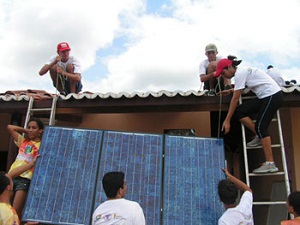Brazil legislation could help solar market take off
 Brazil could be poised for major solar development if the government there passes some pending legislation that would increase opportunities, particularly for distributed generation projects.
Brazil could be poised for major solar development if the government there passes some pending legislation that would increase opportunities, particularly for distributed generation projects.
“At the moment there is very little installed capacity in Brazil,” said Laura Dinnewell, organizer of the Solar Brasil: Green Power Conference scheduled in Sao Paulo Oct. 9 and 10. “The country’s only large-scale solar farm is a 1-megawatt plant in Taua.”
She said the Electricity Research and Development Fund recently researched the solar market in Brazil and heard from 18 consortia about projects totaling a little over 20 megawatts.
Brazil relies heavily on hydro-electric power, which accounts for 70 percent of the country’s energy mix and can be produced affordably.
In the last few years, the Brazilian government has subsidized and promoted wind power with great success. It has come in even cheaper than natural gas, Dinnewell said.
“Creating these mechanisms for solar could have a similar effect,” she said.
There are two pieces of legislation coming up in the next couple weeks that could open up the market for solar. One is a net metering program that would allow home and small business owners who install solar to feed power into the grid and get credit for it on their electric bills. The other would offer power companies an 80 percent discount on the taxes they pay on energy they produce from distributed solar generation.
“These two pieces of legislation will lay the foundation for a solar market to start to take off,” Dinnewell said.
Brazil is well-positioned to be a leader in the solar market if the government gets behind the industry, Dinnewell said. Its energy demand is expected to increase by 60 percent over the next decade. The country has also committed to reducing is CO2 emissions by 36 to 39 percent by 2020.
“There is definitely very strong potential for Brazil to really drive forward solar and become as prominent as Germany and Italy have been,” Dinnewell said.
The trick will be balancing subsidies, so they can remain stable and reliable. The problem in Europe was that the subsidies came on strong to start and then scaled back.
Brazil is also interested in creating a domestic market for solar rather than relying on imports and foreign companies. But that doesn’t mean there won’t be room for international businesses to establish themselves in Brazil.
“We have already seen lots of international solar companies moving into the market with companies starting early development work so that they are ready if the market takes off,” Dinnewell said. “Once again, if we look to the wind sector for inspiration, we can see how many of the big companies have actually started manufacturing in Brazil, and it looks likely that the government will also want to create a domestic manufacturing industry for solar so these opportunities also lie there.”
She said the conference in October will provide an opportunity for those international companies to learn about solar opportunities in Brazil and for Brazil to learn about options for moving the industry forward.
Image courtesy of United States Agency for International Development.



